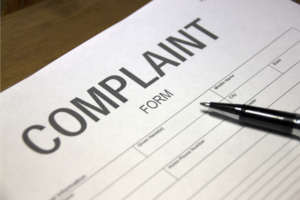How to Handle Complaints to the Michigan Cannabis Regulatory Agency
 Like any other retail or service provider, Michigan cannabis businesses occasionally face complaints from customers or employees. However, unlike most other Michigan retailers, cannabis-related businesses are closely monitored by state and local authorities. If you receive notice from the Michigan Cannabis Regulatory Agency (CRA) of a complaint against your business, it’s important to respond appropriately.
Like any other retail or service provider, Michigan cannabis businesses occasionally face complaints from customers or employees. However, unlike most other Michigan retailers, cannabis-related businesses are closely monitored by state and local authorities. If you receive notice from the Michigan Cannabis Regulatory Agency (CRA) of a complaint against your business, it’s important to respond appropriately.
What Is the CRA Complaint Process?
Michigan’s cannabis-related businesses must comply with industry-specific regulations and restrictions, which change frequently as the industry evolves. They also must abide by workplace safety standards, wage and hour laws, non-discrimination protections, and other statutes that regulate Michigan businesses. Complaints directly relating to cannabis products, including adverse reactions, are investigated by the CRA. (Complaints about other aspects of a business’s operations, like claims for unpaid wages or building code violations, should be made to the appropriate state or local agency.)
Complaints may be initiated independently by the CRA, which conducts random inspections of business facilities and financial audits. They can also be made by an individual reporting a suspected violation. There are many bases for CRA complaints. These include:
- Packaging that is false, misleading, deceptive, or appealing to minors.
- Employees who aren’t properly certified or trained to sell, handle, or process products.
- Failure to properly perform or document product testing and inspection.
- Poor security or maintenance of sales premises or production facilities.
- Improper or incomplete filing of annual financial reports.
The CRA requests that an individual filing a complaint provide as much detail about their issue as possible, including the business name and contact information, description of their issue, and the names of any persons associated with the complaint. This can be easily done on the CRA’s website; the reporting individual may remain anonymous if they choose.
The CRA’s intake department reviews each complaint and decides whether it should be dismissed for failure to state a possible claim (such as a customer who disliked a product or a neighbor who objects to the business for personal reasons).
If the CRA determines that a complaint describes a potential violation of state regulations, it will assign it to one or more CRA Regulation Agents. These individuals investigate the complaint and licensee to determine if any violation of state law or administrative rules has occurred. This may include asking the complainant follow-up questions, contacting the business and its employees, requesting documents or evidence (such as security footage) from the company, contacting vendors or other third-party business associates, and reviewing other business records.
How Do I Respond to a Complaint Against My Cannabis Business?
The CRA will notify you if a complaint has been filed against your cannabis-related business. If the CRA believes there is an imminent threat to public safety, health, or welfare, it may temporarily suspend your cannabis license (a “summary suspension”). For example, if a complaint alleges that a customer became violently ill after using a cannabis product purchased at your store, you may be ordered to temporarily stop selling cannabis products while the CRA investigates.
You have thirty days to respond in writing after being notified of a complaint. If you do not, the CRA can take disciplinary action against you. Although an attorney isn’t required, obtaining legal representation helps ensure you comply with deadlines, prepare a complete response, and protect your interests. An experienced cannabis lawyer can help you understand the applicable regulations and negotiate a resolution.
You are entitled to request a hearing before an Administrative Law Judge (ALJ) on the substantive allegations; you may also request a hearing to determine whether temporary restrictions are necessary and justified. For example, an ALJ may lift a suspension and allow you to resume sales operations if the complaint relates to improper past financial reports and you show you are currently in compliance.
What Happens if a Business or Individual Is Disciplined?
If the CRA or ALJ determines that a business or individual has violated an administrative rule, they face various penalties. Your cannabis production, distribution, or processing license may be temporarily suspended or permanently revoked. You may be liable for significant fines and be ordered to make changes or implement procedures to prevent future violations.
In addition to the CRA complaint process, you may also face civil or criminal litigation (for example, if the complaint relates to workplace safety and endangers the health and welfare of your employees).
Disciplinary actions taken against a business or individual are publicly available on the CRA’s website. Each month, it updates the Disciplinary Action Reports (DAR) database detailing the formal administrative complaints that have been resolved against adult-use and medical cannabis licensees. Each DAR contains the name of the licensee the action was taken against, the record number of that licensee, the date the disciplinary action was issued, the penalty imposed, and the nature, type, and category of administrative rule violation.
Contact an Experienced Michigan Cannabis Lawyer
Understanding the rules and regulations for Michigan cannabis businesses can seem overwhelming. State and local governments have enacted complex reporting requirements, licensing rules, and operations regulations. Failing to comply can lead to high fines and endanger your business. An experienced Michigan cannabis business attorney can help you respond to a complaint and take steps to prevent future issues.
